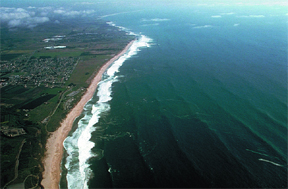 The U.S. Commission
on Ocean Policy released its report for comment at the end of April, documenting
the state of ocean research, the oceans themselves, and a multitude of recommendations
and suggestions on how the United States should improve and continue managing
its oceans. With fishing stocks crashing and pollution from stream runoff and
other human activities on the rise, the ocean policy commission’s report
calls for a uniform national policy and reinvigoration of ocean research.
The U.S. Commission
on Ocean Policy released its report for comment at the end of April, documenting
the state of ocean research, the oceans themselves, and a multitude of recommendations
and suggestions on how the United States should improve and continue managing
its oceans. With fishing stocks crashing and pollution from stream runoff and
other human activities on the rise, the ocean policy commission’s report
calls for a uniform national policy and reinvigoration of ocean research.In a recent report, the U.S. Commission on Ocean Policy calls for a uniform national policy on ocean research — including management of coastal areas such as the West Coast beach shown here. Photo by Martin Miller, University of Oregon.
About 5 percent of the planet’s oceans have been explored, according to the report. “We know more of the topography of Mars than of the seafloor,” says John Orcutt, a geophysicist at Scripps Institution of Oceanography and president-elect of the American Geophysical Union, who reviewed the report during its creation. With funding similar to what space activities receive, he says, ocean researchers could easily obtain seafloor data that would inform further research and policy-making.
“What is critically important for ocean science in general, and geology and geophysics in particular, is a recommendation to double the research dollars,” Orcutt says. That suggestion primarily affects the National Science Foundation (NSF), as the Navy retreats from funding basic research, Orcutt says. Most of the report, however, deals “almost exclusively with NOAA.”
Marcia McNutt, president of the Monterey Bay Aquarium Research Institute and a member of the ocean commission’s Science Advisory Committee, notes that NSF and its partners have already started assembling the components of an ocean observing system, a major point of future research according to the report. However, future funding will be needed to maintain such long-term observing programs.
Such funding issues most likely will remain difficult, says Andy Rosenberg, a marine policy specialist at the University of New Hampshire and a member of the ocean commission. The commission report suggests an ocean trust fund much like the Highway Trust Fund administered by the Department of Transportation. The fund would come from money from leases for offshore activities, such as oil and gas exploration and recovery. Rosenberg says that future permitted activities, such as bioprospecting, wind farms and aquaculture, could join the list as they develop.
The current federal management structure, McNutt notes, is quite fragmented, which has been partly beneficial because of the myriad of organizations doing research in different ways; however, the fragmentation makes permitting difficult. “The laws and jurisdiction and overlapping management regimes are incredible,” she says, joking that the first telegraph wire across the country would never have happened if it had to go through the same process.
To clarify such decision-making and policy processes, the ocean policy commission’s report suggests creating local and state governance mechanisms in addition to a National Oceans Council in the executive branch, directly under White House supervision but not a cabinet-level post. The Pew Oceans Commission report released last summer, which made many recommendations similar to those of the president’s commission, suggested a whole new independent agency for oceans.
The report, Rosenberg says, is a step toward coordinating laws and ocean policy, and also a call for a strong conservation ethic. “It sets an approach to ecosystems management,” he says, as well as to research and education. It also, he says, recommends the United States sign on to the United Nations’ Law of the Sea Convention, an international agreement between more than 140 countries governing ocean resources and ship passage among other issues, established in 1995.
In May, legislators began the long process of sifting through the preliminary report’s recommendations — and introduced some legislation already calling for moving NOAA into the Department of Interior. While the outcomes of both of the reports and the political process remain to be seen, Rosenberg says that he hopes to see results in the next five years. If the Pew and Ocean Commissions reports are not followed up, he says, “we’re in real trouble.”

